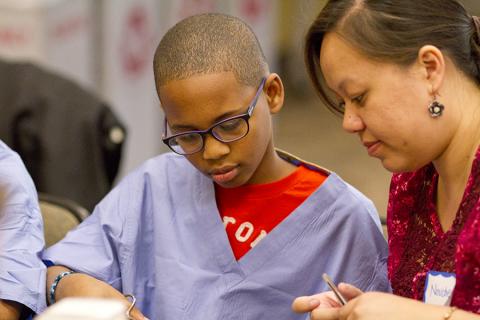
Pioneering Health Care

Two UROC-based medical programs aim to prepare kids for health care careers and doctors for practice in a complex world.
As professors in the University of Minnesota’s Department of Family Medicine and Community Health, Shailendra Prasad and Reneé Crichlow are keenly aware that clinical care is only one way to address the complexities of health care in underserved communities. Through the department’s North Memorial Family Medicine Residency Program, they prepare medical residents for future practice with an eye on the big picture with training at North Memorial Hospital and the Broadway Family Medicine Clinic.
“Sometimes when you look at only clinical medicine you stop looking at other factors that can seem abstract or too complicated, like nutrition, social situations and other social determinants of health,” Prasad explains. “We want to help students and young physicians see the limitations of approaching issues from just a clinical medicine lens while highlighting areas that need further exploration.”
Outside of clinical settings, Prasad and Crichlow also run two programs aimed at broadening people’s thinking around health care. Both groups meet monthly at the University’s Robert J. Jones Urban Research and Outreach-Engagement Center (UROC) in North Minneapolis. The first program, known as CHAT (Community Health and Advocacy Talks), draws a mix of health professionals, students and community members for talks on everything from new models of pregnancy care and the importance of early childhood education to health care for the homeless and new immigrants.
“We want to have active discussions and create a forum for talking about a lot of different and complex issues,” Prasad says, adding that UROC’s location on two main bus routes helps draw a wide audience. Working with Andrew Furco, the University’s Associate Vice President for Public Engagement, Prasad hopes the next step will be to capitalize on the talks by finding ways to create small-scale, health care-related community-engaged projects. “We’ve had a conversation about the sexual exploitation of teenagers, for example, so maybe we could look at how to screen for sexual exploitation at youth shelters,” he explains.
While Prasad focuses primarily on CHAT, Crichlow heads up The Ladder (https://theladdermn.org/). Launched in 2011, the program is for youth who are interested in health careers. The goal is to equip kids, who are often from underserved communities, with the skills and mentorship they will need to succeed.
Members of the group include kids as young as 9, as well as high school and college students, medical students and residents, interns, nurses, physicians and pharmacists. “I like to call it a community of purpose,” says Crichlow, who decided to launch the successful program after noticing how few medical students and residents were coming out of North Minneapolis.
“Our motto is ‘Lift as you climb, build as you grow,’” she adds, explaining how The Ladder uses a mentorship approach because research shows that students learn the most about achievement in school from people who are within two or three years of their grade level. “The pathway to medical school starts early, so if you wait until high school, you aren’t prepared the way you need to be,” she says.
Over the last five years the program has been so successful it will soon be rolled out on a national level as a non-profit organization. Crichlow attributes some of that success to the program’s partnership with UROC. “Being able to meet at the same location every month has provided an anchor for students and allowed us stay lean and flexible,” she says. “We hung in there and we’re ready to become a long-term organization.”